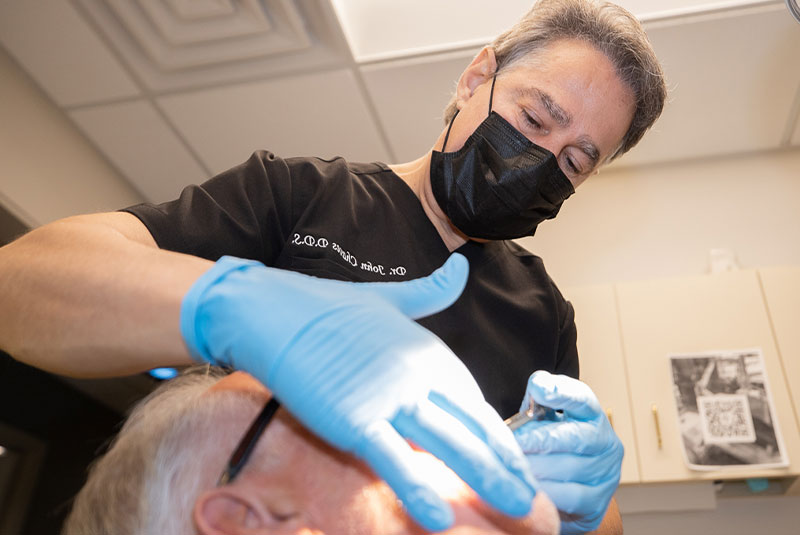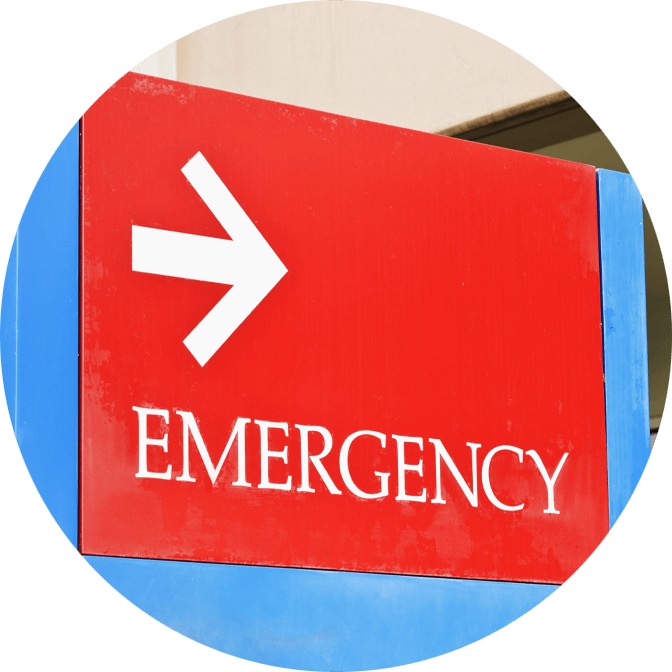

When a dental emergency strikes, every second counts. You may initially focus on whether or not you have a broken tooth or a cracked tooth. However, soft tissue injuries in the mouth, such as cuts, tears, or trauma to the gums, tongue, lips, or inner cheeks, can be painful, frightening, and potentially serious if not treated promptly.
Are you looking for emergency dental care near you? If you have any questions or would like to schedule a consultation with Dr. Chaves, contact our Woodland Hills dental office at 818-491-7294 today! We also proudly serve patients coming from West Hills, Canoga Park, Winnetka, and the surrounding areas.
If you require an emergency dentist near you in Woodland Hills, CA, our team is here to promptly relieve your pain and restore your oral health.

Dental soft tissue injuries refer to damage to the soft, non-bony tissues of the mouth, including the gums, tongue, lips, and inner cheeks. These injuries can range from minor cuts and abrasions to severe lacerations or puncture wounds. Since the mouth is rich in blood vessels, soft tissue injuries often bleed heavily, which can be alarming, but prompt care can prevent complications like permanent damage ot infection in sore and swollen gums.
Dr. John Chaves, one of the best dentists in Woodland Hills, is here to answer your questions! In the meantime, consider the signs of the dental emergency you may be experiencing. The more detail you can provide your dentist, the better.
Cuts or tears to the lips, tongue, or gums, often caused by sharp objects, teeth, or trauma.
Bruising of soft tissues, typically from blunt force, such as a sports injury.
Scrapes or surface injuries to the inner cheeks or gums, often caused by rough foods or dental appliances.
Deep injuries caused by sharp objects penetrating the soft tissue.
Chemical or thermal burns from hot foods, beverages, or substances like hydrogen peroxide.
Accidental bites to the tongue, lips, or cheeks, often during eating or seizures.

We offer several types of sedation to alleviate dental anxiety and ensure your ultimate comfort.
Soft tissue injuries in the mouth can lead to excessive bleeding, infection, or nerve and blood vessel damage if not properly treated. Additionally, injuries near teeth or dental restorations (e.g., dental crowns, braces) may require specialized care to prevent further complications. Acting quickly allows for better outcomes and minimizes pain.
Contact our emergency dental office near you at 818-491-7294 to get immediate treatment.
Accidental dental trauma ranks among the leading causes of soft tissue injuries. Such soft tissue mouth trauma often stems from unexpected falls or collisions, which can occur during sports activities, playful interactions, or even routine daily tasks. For example, a slip while running or a collision during a basketball game may result in a painful cut to the lip or tongue.
Similarly, car accidents or physical altercations can inflict significant trauma to the mouth’s soft tissues, leading not only to broken or chipped teeth but also to lacerations, bruises, or puncture wounds.
Issues related to dental structures or appliances frequently contribute to soft tissue injuries. A sharp or broken tooth, for instance, can easily slice into the gums, tongue, or inner cheeks, particularly during chewing or speaking. Ill-fitting dental appliances, such as braces, dentures, or retainers, may rub against the soft tissues, causing painful abrasions or ulcers over time.
Additionally, trauma from dental procedures, such as tooth extractions or dental implant placements, can inadvertently damage surrounding soft tissues. These injuries may seem minor at first, but they can worsen without proper care.
Certain medical conditions can increase the likelihood of soft tissue injuries in the mouth. For individuals with epilepsy or other seizure disorders, accidental biting of the tongue or cheeks during a seizure is a common cause of injury. Oral infections or ulcers, such as those caused by herpes simplex virus or aphthous ulcers, can weaken the soft tissues, making them more susceptible to tears or abrasions.
External factors, such as burns or foreign objects, can also lead to soft tissue injuries. Consuming excessively hot foods or beverages, like scalding coffee or pizza, may cause thermal burns to the lips, tongue, or inner cheeks. Chemical burns can occur from exposure to substances like hydrogen peroxide or certain medications if improperly used in the mouth.

PLEASE NOTE: If you experience neck or head pain, are bleeding uncontrollably, feel dizzy or suffered severe trauma, it’s crucial to seek immediate medical attention by calling 911 or getting transported to the nearest medical facility. Medical personnel are best equipped to assist you with these serious symptoms.
A dental soft tissue emergency involves significant pain, bleeding, or damage to the gums, lips, tongue, or cheeks that doesn’t resolve with basic first aid. Examples include deep cuts, uncontrollable bleeding, or signs of infection.
Minor injuries can be managed with first aid, such as rinsing with saline and applying pressure. However, professional care is essential for traumatic dental injuries like deep wounds, persistent bleeding, or signs of infection.
If the cut is deep, gaping, or continues bleeding after 15 minutes of pressure, you likely need stitches. An emergency dentist in Woodland Hills can evaluate the injury and determine the best course of action.
A dental soft tissue injury can be painful and overwhelming, but you don’t have to face it alone. At John M. Chaves, DDS, our team is ready to provide fast, compassionate care to relieve your pain and restore your oral health. Contact Dr. John Chaves’ Woodland Hills dental office at 818-491-7294 to schedule a consultation with our emergency dentist near you today.
We look forward to helping you achieve and maintain a healthy, beautiful smile! We also proudly serve patients coming from West Hills, Canoga Park, Winnetka, and the surrounding areas. Whether you need to schedule an emergency dental visit, cosmetic dentistry, root canal therapy, or pain relief, we’re here to help!
I understand the information disclosed in this form may be subject to re-disclosure and may no longer be protected by HIPAA privacy regulations and the HITECH Act.
